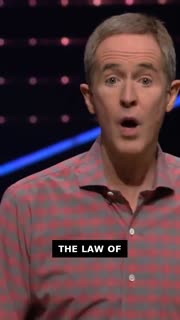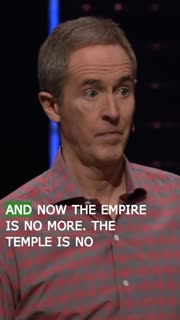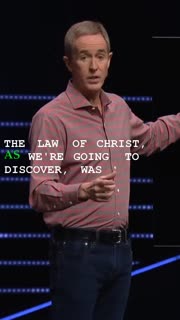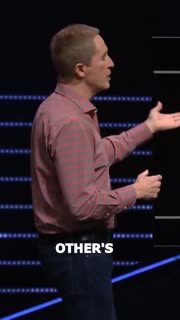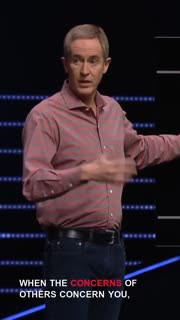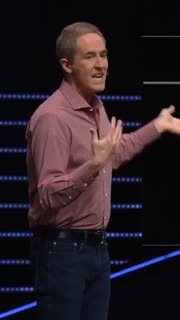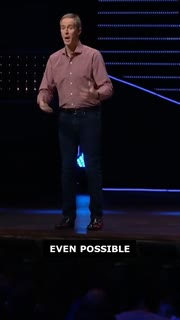Faith First: Navigating Politics Through Christ's Love
Devotional
Sermon Summary
Bible Study Guide
Sermon Clips
### Quotes for Outreach
1. "Are we willing to put our faith filter ahead of our political filter? Are we willing to be Christ followers first and Republicans and Democrats and Libertarians and whatever else you might be? Second, are we willing to follow Jesus? This is the tough one. Are we willing to follow Jesus when following Jesus creates space between us and our political party, space between us and our political platform, or the platform of our political party, and space between us and our political community?" [00:59] (28 seconds)
2. "Jesus did not come to take sides. He came to take over. But he said it a lot better than I just did, okay? It was so powerful. I never forgot that. And he's absolutely right. Jesus came. Jesus came to introduce the kingdom of God to earth. The kingdom of God values, the upside-down kingdom, where those with the wealth and the power leverage their wealth and power and resources. For those that have less power, less resource, less resource." [04:37] (27 seconds)
3. "The kingdom of God, where the king laid down his life for his subjects rather than demanding his subjects lay down their lives for him. The kingdom of God that was so broad and inclusive that he said, and everybody is invited to participate in it. But the kingdom of God will always, perhaps, I think this is the case, but this is just my opinion. The kingdom of God will always, in some detail and at some level, conflict with the kingdoms of men." [05:00] (29 seconds)
4. "The law of Christ should inform our collective conscience. Let me give you a couple of quick examples, because as simple as that is, this is a powerful, powerful, powerful dynamic. In fact, this dynamic shaped Western culture. You hear me say that all the time, but it's absolutely true. For example, once upon a time, all over the world, everywhere in the world, every village, every town, every kingdom, it was self-evident, which means it was obvious. It was unquestioned. It was like, duh." [13:47] (29 seconds)
5. "So listen, listen, learn, and love, and don't miss part three of Talking Points. Andy, this is so naive. Do you really think that's gonna make any difference? You just remember this. Once upon a time, there were a handful of Jesus followers crushed between an empire and the temple. And they gave to Caesar what was Caesar's. And they gave to God what was God's. Their lives. And now the empire is no more. The temple is no more. Rome's most famous emperor is nothing but a footnote in the story of Jesus of Nazareth." [36:21] (60 seconds)
### Quotes for Members
1. "The law of Christ, as we're going to discover, was his shorthand for Jesus' new covenant command that we talk about all the time. When Jesus gathered with his disciples for the final covenant, he said, I'm going to be a substitute for all the other commands. You had 613, you had Torah, but I'm giving you a new command because we're establishing a new covenant. And as you probably know, the new command was simple. It was, you are to love one another, with a caveat, as I have loved you." [07:17] (27 seconds)
2. "Carry each other's burdens. When you see somebody who's burdened financially, somebody's burdened with kids, somebody's burdened with work, somebody's burdened with a physical, ailment, or he's gotten tripped up in life. You are to carry one another's. And again, this isn't each other thing. This isn't everybody's end. This is the body of Christ functioning like the body. Carry each other's burdens. And if you do, look at this. If you'll do that, you are fulfilling. And here it is again, the law of Christ." [09:49] (26 seconds)
3. "When the concerns of others concern you, and you act on it, you are fulfilling the law of Christ. You are doing what Jesus told the disciples to do. And again, the New Testament marching orders for those of us who were Jesus followers. So here's the thing. As Jesus followers, all of all persuasions, regardless of your political persuasion, if you're a Jesus followers, the law of Christ, that is your marching orders. And the law of Christ should inform over time as we grow as Christians, our conscience." [11:07] (31 seconds)
4. "Never, please, never, ever, ever burn a relational bridge over a political view. Never, ever, ever burn a, well, you say, well, they started the fire. Okay, well, they started the fire on their end of the bridge. Don't start a fire on your end of the bridge. Never burn a bridge, a relational bridge, because over a political view. Because this goes back to Jesus' commandment. This goes back to the cross. This goes back to the epicenter of what we believe as Christians. The you beside you is more precious to God than your potentially flawed view." [35:06] (33 seconds)
5. "And that it's even possible to disagree politically, to love unconditionally, while we pray for unity. Because at Calvary, at Calvary, at the cross, we lost our right to do anything less than. So listen, listen, learn, and love, and don't miss part three of Talking Points." [36:59] (31 seconds)
Ask a question about this sermon
1. "Are we willing to put our faith filter ahead of our political filter? Are we willing to be Christ followers first and Republicans and Democrats and Libertarians and whatever else you might be? Second, are we willing to follow Jesus? This is the tough one. Are we willing to follow Jesus when following Jesus creates space between us and our political party, space between us and our political platform, or the platform of our political party, and space between us and our political community?" [00:59] (28 seconds)
2. "Jesus did not come to take sides. He came to take over. But he said it a lot better than I just did, okay? It was so powerful. I never forgot that. And he's absolutely right. Jesus came. Jesus came to introduce the kingdom of God to earth. The kingdom of God values, the upside-down kingdom, where those with the wealth and the power leverage their wealth and power and resources. For those that have less power, less resource, less resource." [04:37] (27 seconds)
3. "The kingdom of God, where the king laid down his life for his subjects rather than demanding his subjects lay down their lives for him. The kingdom of God that was so broad and inclusive that he said, and everybody is invited to participate in it. But the kingdom of God will always, perhaps, I think this is the case, but this is just my opinion. The kingdom of God will always, in some detail and at some level, conflict with the kingdoms of men." [05:00] (29 seconds)
4. "The law of Christ should inform our collective conscience. Let me give you a couple of quick examples, because as simple as that is, this is a powerful, powerful, powerful dynamic. In fact, this dynamic shaped Western culture. You hear me say that all the time, but it's absolutely true. For example, once upon a time, all over the world, everywhere in the world, every village, every town, every kingdom, it was self-evident, which means it was obvious. It was unquestioned. It was like, duh." [13:47] (29 seconds)
5. "So listen, listen, learn, and love, and don't miss part three of Talking Points. Andy, this is so naive. Do you really think that's gonna make any difference? You just remember this. Once upon a time, there were a handful of Jesus followers crushed between an empire and the temple. And they gave to Caesar what was Caesar's. And they gave to God what was God's. Their lives. And now the empire is no more. The temple is no more. Rome's most famous emperor is nothing but a footnote in the story of Jesus of Nazareth." [36:21] (60 seconds)
### Quotes for Members
1. "The law of Christ, as we're going to discover, was his shorthand for Jesus' new covenant command that we talk about all the time. When Jesus gathered with his disciples for the final covenant, he said, I'm going to be a substitute for all the other commands. You had 613, you had Torah, but I'm giving you a new command because we're establishing a new covenant. And as you probably know, the new command was simple. It was, you are to love one another, with a caveat, as I have loved you." [07:17] (27 seconds)
2. "Carry each other's burdens. When you see somebody who's burdened financially, somebody's burdened with kids, somebody's burdened with work, somebody's burdened with a physical, ailment, or he's gotten tripped up in life. You are to carry one another's. And again, this isn't each other thing. This isn't everybody's end. This is the body of Christ functioning like the body. Carry each other's burdens. And if you do, look at this. If you'll do that, you are fulfilling. And here it is again, the law of Christ." [09:49] (26 seconds)
3. "When the concerns of others concern you, and you act on it, you are fulfilling the law of Christ. You are doing what Jesus told the disciples to do. And again, the New Testament marching orders for those of us who were Jesus followers. So here's the thing. As Jesus followers, all of all persuasions, regardless of your political persuasion, if you're a Jesus followers, the law of Christ, that is your marching orders. And the law of Christ should inform over time as we grow as Christians, our conscience." [11:07] (31 seconds)
4. "Never, please, never, ever, ever burn a relational bridge over a political view. Never, ever, ever burn a, well, you say, well, they started the fire. Okay, well, they started the fire on their end of the bridge. Don't start a fire on your end of the bridge. Never burn a bridge, a relational bridge, because over a political view. Because this goes back to Jesus' commandment. This goes back to the cross. This goes back to the epicenter of what we believe as Christians. The you beside you is more precious to God than your potentially flawed view." [35:06] (33 seconds)
5. "And that it's even possible to disagree politically, to love unconditionally, while we pray for unity. Because at Calvary, at Calvary, at the cross, we lost our right to do anything less than. So listen, listen, learn, and love, and don't miss part three of Talking Points." [36:59] (31 seconds)



